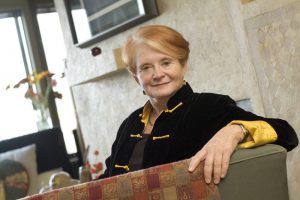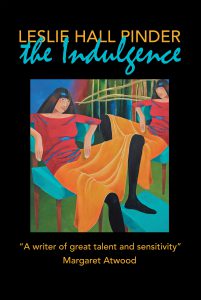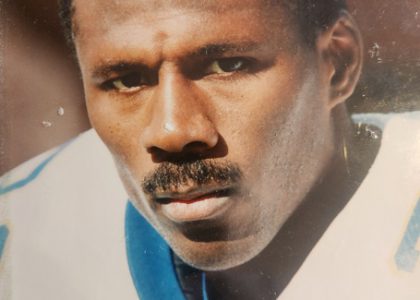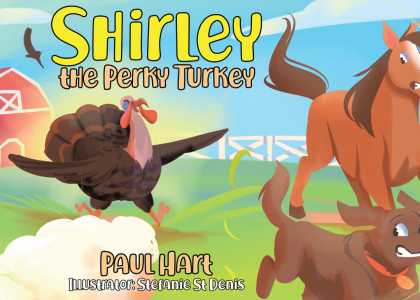Courtroom lawyer turned self-publishing success; Governor General’s Award nominee Leslie Hall Pinder on her life as a full-time writer
By Kate Bell
Tellwell author and Governor General’s Award nominee, Leslie Hall Pinder, puts her decades of experience in the courtroom on paper in her latest crime-fiction novel, The Indulgence. Learn more about the B.C.- based author’s career as a lawyer-turned-writer, how she got a testimonial from Margaret Atwood and why after traditionally publishing three books, she got decided to self-publish.
At age 12, Leslie Hall Pinder was told to write. She was encouraged by her school teacher and, following her teacher’s advice, Hall Pinder’s first short story was broadcast on CBC radio when she was 19-years-old.
Hall Pinder immersed herself into the literary world after high school and went on to complete her Bachelor of Arts in English from the University of Saskatchewan and Dalhousie University. She then started a Masters Program in English at the University of British Columbia, however, her interest in school was beginning to wane; she often skipped class and eventually dropped out to pursue her dream of becoming a full-time writer. But the author’s plan was put on hold when she found casual work in the case report section of the Vancouver Police Department – the lure of the law became absolutely irresistible. She quickly enrolled back in school and, in 1976, she graduated with a law degree from the University of British Columbia. Shortly after, Leslie became the first woman litigator at a large Vancouver law firm.
After working nearly 20 years in law, alongside writing and publishing two novels (one of which that was nominated for a Governor General’s Literary Award), Hall Pinder decided to step back from the legal world and begin writing full-time. She has been a full-time writer since 2005 and the courtroom still plays a major impact on her work which focuses largely on characters who undergo the difficult and corrupting struggle of truth as defined by the law.
After traditionally publishing her first three books, Leslie Hall Pinder chose to self-publish her fourth book with Tellwell. The Indulgence is a story about what happens when love turns to hate and everyone turns to the law.
Marketing consultant Kate Bell sits down with Leslie Hall Pinder to talk about her trade secrets, successes, and struggles.
1. KB: What is your writing process like? Where do you commonly go to write? How do you get in the zone to write?
LHP: Writing for me is a matter of necessity. As a result, I do everything I can to avoid it and am unsuccessful.
After sitting at my desk, starting at around 9 a.m. I pray I will receive an urgent email which will distract me from my writing task, although I don’t want it to be bad news about friends or family. Honestly, I don’t want that.
At the end of writing on the previous day, I make sure I leave the work at a point where I have a plan for what will happen next. Having said that, I have a rule that I will “follow the heat”: that I will go where I sense the most passion and interest, in the plot and in the characters, no matter what I had planned to write.
2. KB: How has your writing style evolved from your first book to now?
LHP: My first novel, Under the House, came out easily and quickly. I thought all my novels would be the same. I was wrong about that. The next three books took a long time because, as I eventually realized, I didn’t really know what the story was about. For example, in Bring Me One of Everything, I thought the book was about my protagonist’s search for the reason Austin Hart killed himself. That was true, but, as I wrote and wrote, and rewrote the book, I realized the story was actually about my protagonist’s search for her father. I take more time, now, in planning the novel, struggling with the storyline, rather than just plunging into the endless writing. As a result, I think my style is less discursive, less self-indulgent, more direct.
3. KB: Your first book, Under the House, received rave reviews from The New York Times, the Chicago Tribune and also Margaret Atwood who called it “A haunting first novel by a writer of great talent and sensitivity. It treats a difficult theme with humanity and admirable complexity.” How did that come about?
LHP: When Under the House was about to be published by Random House, one of the editors asked Margaret Atwood to read the novel and give a blurb, if she was so inclined.
And she was. I was really chuffed by her response. She is a tremendous writer and I was thrilled.
4. KB: Tell me about how your career as a lawyer impacted your writing and the contents of your published novels?
LHP: Having spent so many years as a litigator, the dynamics of a trial hold great interest for me. Every book I’ve written has a trial in it. The courtroom is a place of such contained, regulated passions; one person, the judge, has to manage the deep incivility the parties bring into the courtroom (which is also like a stage) in order to get to the truth.
It can be a strange process. As Judge Semple observes in The Indulgence: “That was one of the problems in pursuing, or being pursued, by the law. In the beginning, there was always too much to say, and in the end, there was even more.”
In the novel, there are many obvious (and not so obvious) allusions to the courtroom, and its players, as being like the bullfight. For each character, there is something which corresponds to the cape for the bull: the enticing thing which they must avoid, but they don’t. Delivered into unpardonable danger, they are tested and tried.
I have a figure in the novel who comes every day to observe the trial of Lucinda Yates. She sits in the courtroom and knits. Everyone — Lucinda, the Judge, the lawyers — notice her and wonder about her. She is like the knitter, Madame Defarge, in A Tale of Two Cities. In the end, she debates whether to cut the thread.
5. KB: Although all four of your books are fiction, are the events based off of real-life characters/events? Is there a specific person or people that your main characters are based on in The Indulgence?
LHP: Each of my books started as the sliver of a story someone told me, or I had experienced. In The Indulgence, I was at a small dinner party where one of the guests, a judge I greatly admired, posed the provocative question to the table: “Have you ever made a mistake which was irrevocable?” It turned out he was trying a case where a father was charged with the abduction of his own daughter. The judge was deeply troubled by the case. I asked him if he would be okay with my attending the trial. I then spent the next few weeks watching the case. It became the foundation for the novel.
Having said that, a novel can’t really take off until everything about it: the characters, the storyline, the atmosphere, becomes its own indelible, contained and believable world, true to itself and its structure and construction. It must become a work of the writer’s imagination, freed from its earthbound roots.
6. KB: How have you been able to maintain a writing career for yourself?
LHP: I published two novels while working as a litigator on land claims issues for my indigenous clients. When my second novel, On Double Tracks, was nominated for a Governor General’s Award, I considered quitting the law and writing full-time. But land claims were in their infancy, and I couldn’t abandon my clients until I felt we had established a stronger foundation, in the western legal system, for the claims. That took another ten years. All of which is to say my working as a lawyer, full-time, eventually funded my working as a writer, full-time.
7. KB: After traditional publishing your first three books, why go the self-publishing route for your fourth book?
LHP: It was taking too long to interest a traditional publisher: so much tentativeness and caution. My novel was ready, so I decided to just go for it with Tellwell, about whom I’d heard very good things. It’s so much more of a hands-on experience, of course, and the crew at Tellwell are amazing and wonderful and it’s really interactive. I like the experience. It doesn’t feel so much like self-publishing as collaborative publishing.
8. KB: What has been your proudest moment as a writer?
LHP: The great British actress, Juliet Stevenson, agreed to be filmed reading the most challenging chapter in The Indulgence. In that chapter, my protagonist, the actress Lucinda Yates, goes to her first bullfight. She projects her troubled relationship with Eva Ryder on to the fight. Watching Juliet do that, watching her take my words and Lucinda’s crazy projection, and give them wings, has been my proudest and most glorious experience as a writer. The words I wrote (and rewrote) alone at my desk, struggling to be precise, to translate Lucinda’s experience to the page, and then seeing (and hearing) Juliet join her craft with mine, is (so far) unparalleled.
The Indulgence is now available online at Amazon, Chapters Indigo, Barnes & Noble as well as in select bookstores in Vancouver, BC.
Learn more about Leslie Hall Pinder on her website and Facebook page.





